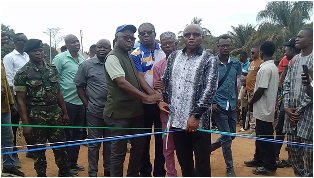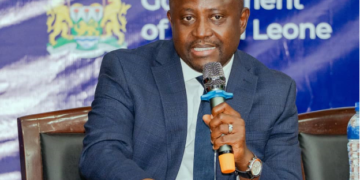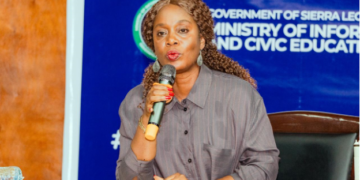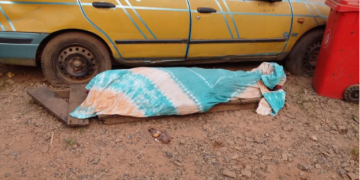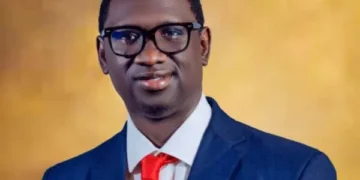By Alpha Amadu Jalloh
Mr. President, “Tiday Ar nor Dae Tell Yu Aw Do.” Mr. President, I address you not only as a concerned citizen but as someone who finds himself at the crossroads of frustration and bewilderment. Today, I speak for countless Sierra Leoneans who find themselves disillusioned by the recent events that have painted our beloved nation in a dismal light. The scandal surrounding your daughter, Agnes Bio, and her marriage to Jos Bole, allegedly one of the most wanted men in the Netherlands for drug-related offenses has left an indelible stain on Sierra Leone’s reputation. In a time when we strive to show the world our resilience, creativity, and dignity, this development has cast shadows of doubt and disbelief on our entire nation.
At the outset, let us acknowledge that personal matters of marriage are usually private affairs; they belong, in large part, to the realm of family decisions and individual choices. Yet, when the private life of our Head of State’s family becomes intertwined with international allegations of criminal activities, the lines between personal and public interests inevitably blur. It is one thing for a President to love and support his daughter; it is quite another when that support leads to questionable associations that threaten the moral standing and integrity of the highest office in the land. Mr. President, in this situation, the entire Sierra Leonean populace is now grappling with the consequences of what appears to be a poorly managed and ethically fraught scenario.
In recent weeks, the international media, including BBC, CNN, Al Jazeera, and Reuters, has been awash with stories implicating Sierra Leone in harboring or hosting a criminal. These are not trifling tabloids or local gossip columns; these are global networks whose reach extends across continents, shaping international opinion and foreign policy decisions. The fact that our country’s name appears alongside allegations of harboring a fugitive raises unavoidable questions about your administration’s stance on crime, corruption, and international cooperation. The suspicion is not merely about one individual; it is about the priorities and values that guide your leadership. If indeed Sierra Leone is inadvertently sheltering someone wanted for serious drug offenses, what does that say about our commitment to law, justice, and accountability?
Meanwhile, ordinary Sierra Leoneans, law-abiding, hardworking, and ambitious, bear the brunt of these damaging headlines. Reports abound of Sierra Leoneans being subjected to humiliating searches and interrogations at international airports. Our people, traveling abroad for business, education, or simply visiting family, find themselves stigmatized as potential criminals. A handful of unscrupulous individuals can taint an entire community, and, in our case, the association seems to start right at the doorstep of the State House. Mr. President, this is not merely about embarrassment; it is about the very real socio-economic consequences that follow when a nation is branded untrustworthy in the eyes of the international community.
Even more alarming, Sierra Leoneans scattered across Asia face grave circumstances, with some awaiting execution for drug charges. As a nation, we ought to be deeply concerned about their plight. Many of these men and women might have fallen prey to desperation, lured by false promises and unscrupulous networks. Regardless of the individual backstories, these are our compatriots, Sierra Leoneans, and their destiny rests in the hands of foreign governments and complex legal frameworks. In times past, we have looked to our government for support, for legal aid, and for at least the moral backing necessary to plead for leniency or a fair trial. Yet, when these same governments read headlines suggesting that our own First Family is entangled with drug traffickers, why would they heed our diplomatic appeals for mercy or justice?
Mr. President, when the father of the bride, our nation’s leader, is perceived to have a familial link to a notorious fugitive, our moral authority to advocate for our citizens abroad diminishes. Any well-intentioned entreaty from your office risks being undermined by questions like, “Is this government serious about eradicating the drug trade, or is it complicit in sheltering criminals?” One cannot help but wonder if any phone call placed from Freetown to an Asian capital, pleading for clemency for Sierra Leoneans on death row, might be met with silent judgment or outright skepticism.
It is not simply a question of public relations or saving face on the global stage; this is about our nation’s soul and the duty of those in power to protect and serve. In the swirl of allegations, people are now asking pointedly, “Mr. President, where did the private plane come from? Usai Di Money Commot fo Da Plane Dae?” Because when extravagant acquisitions coincide with unsavory affiliations, the speculation becomes deafening. Is it funded through legitimate channels? Are taxpayer money or questionable deals part of the story? The vacuum of transparency breeds rumors, and those rumors do more harm to your administration’s credibility than any propaganda from political opponents could.
Mr. President, I must also raise the issue of our fragile economy. We have millions of people living below the poverty line, struggling daily to put food on the table, send their children to school, or access basic healthcare. Our infrastructure is still recovering from decades of challenges, from civil strife to outbreaks of disease and resource mismanagement. In the midst of these hardships, any sign of ostentatious wealth or questionable spending from the corridors of power further alienates the citizenry, especially the youth who are already disillusioned and restless.
Leadership is not only about enacting policies or giving stirring speeches; it is about embodying integrity and moral fortitude. When we, as citizens, see a glaring disconnect between the hardships we endure and the lifestyles of those who govern us, despair sets in. The current scandal has the potential to dismantle the trust painstakingly built between the government and the governed. It has the potential to roll back the progress made in recent years in rebranding Sierra Leone as an emerging economy and a safe destination for investors.
Moreover, the shadow of drug-related crimes is a particularly damaging one. Around the globe, governments are clamping down on narcotics and money laundering; cooperation among international law enforcement agencies is at an all-time high. If Sierra Leone is viewed as a weak link in the global fight against drug trafficking, it stands to face sanctions, reduced foreign direct investment, and strained diplomatic relations. Our people cannot afford the ripple effects of such a reputational downturn.
Mr. President, it is often said, “He who comes to equity must come with clean hands.” How can your administration advocate for the lives of Sierra Leoneans on death row for drug charges if allegations persist that your own family member is married to a notorious drug lord? The moral high ground disappears when personal dealings contradict public pronouncements. Therefore, it becomes imperative that your office clears the air, and not through vague statements or hollow denials.
Transparency, thorough investigation, and accountability are the only ways out of this quandary. The citizens of Sierra Leone deserve a full explanation: Regarding Agnes Bio’s marriage to Jos Bole: Was due diligence conducted? the allegations against him verified, and what stance has your administration taken to cooperate with international authorities? Regarding the private plane: Who owns it, and who financed it? If it is leased or borrowed from whom?. And if purchased with what funds? A public audit or at least a transparent disclosure would help to clear the fog of suspicion.
Regarding the fate of Sierra Leoneans on death row in Asia: What concrete steps has your government taken to provide legal assistance, advocate for fair trials, or negotiate prisoner exchange treaties (where applicable)? If these steps are not possible or have been compromised, explain why.
These are not trivial matters. They concern the collective dignity of Sierra Leoneans around the globe. Whenever your administration fails to provide clarity, it inadvertently casts each Sierra Leonean under the shadow of suspicion. The outward ripple effect is that potential investors hesitate, foreign universities question scholarship recipients, and Sierra Leonean professionals seeking jobs abroad might find themselves sidelined. Everyone pays a price for controversies that begin at the top.
Mr. President, history has taught us the importance of good governance, especially in a country still mending from the wounds of civil war and the scars of underdevelopment. Sierra Leone, a nation of vibrant cultures and resilient people, cannot allow itself to be dragged down by allegations of harboring criminals and misappropriating state resources. We stand at a pivotal moment in our national story. Will we choose to uphold the rule of law, honesty, and accountability, or will we allow nepotism and secret dealings to define our legacy?
Your presidency has promised reforms, championed unity, and worked, at least in rhetoric, to restore our global standing. The blow dealt by this scandal represents not just a challenge but a call to align your actions with your pronouncements. As your fellow citizen, I believe it is not too late to reclaim the narrative. Sierra Leoneans are, by nature, forgiving people. We have forgiven past misdeeds of political figures. We have extended goodwill in the hope of better governance. Yet that goodwill is not inexhaustible.
The international community is watching. More importantly, we, the citizens, are watching and waiting for your response. Do not underestimate the reservoir of frustration that is building among young people, the diaspora, and the everyday wage earners who see their future jeopardized by the current fiasco.
It is time to demonstrate true leadership. Issue a clear statement acknowledging the seriousness of these allegations. Establish an independent committee or commission to investigate the matter of Mr. Bole and any potential link to drug trafficking. Make its findings public. If wrong has been done, own up to it and make amends. If laws have been broken, they must be enforced, regardless of who is involved in the family or not.
This scandal could mark the beginning of the end of Sierra Leone’s quest for international respectability, or it could become a turning point where you, Mr. President, choose to correct course, setting a courageous example for leaders around the world: that no one, not even a President or his family, is above scrutiny and the rule of law.
“Tiday Ar nor Dae Tell Yu Aw Do.” I say that with humility, yet with an earnest plea. This crisis has put all of us under a microscope. The question now is: Will you let it shatter our dignity, or will you harness it as an opportunity for redemption and renewed unity? The ball is in your court, Mr. President. The world waits. Sierra Leone waits. And the souls of those languishing in foreign prisons wait for the kind of leadership that can only be exercised through unwavering moral courage and transparent governance.


